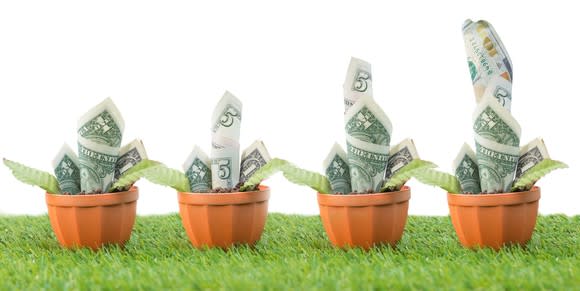3 Stocks That Could Put Alibaba's Returns to Shame
China-based online and mobile commerce behemoth Alibaba (NYSE: BABA) burst onto the scene in 2014 with a massive initial public offering on the NYSE, and it hasn't disappointed since. The stock is up nearly 100% since its debut, and the company is on track to grow sales by 30% or more per year.
But we spoke to our Foolish investors, and they believe you could do even better in the growth department. They suggest you consider biotech royalty company Ligand Pharmaceuticals (NASDAQ: LGND), payment giant PayPal (NASDAQ: PYPL), and cloud-based multichannel commerce platform provider Shopify (NYSE: SHOP) if you want returns that could put Alibaba's to shame.

Image source: Getty Images.
"Royalty" in the drug development space
Sean Williams (Ligand Pharmaceuticals): China's fast-growing online and mobile commerce giant Alibaba has been a force to be reckoned with since its initial public offering. Though it might be tough to find a high-growth stock that could best such a performance, Ligand Pharmaceuticals may have a shot.
As the name implies, Ligand is in the drug development industry, but it's far from your traditional drug stock. Rather than taking compounds from the discovery stage, through preclinical and clinical studies, and eventually to pharmacy shelves, Ligand has positioned itself as an owner of intellectual property that entitles it to royalties on the net sales of products containing its technology. Perhaps its best known IP is Captisol, which helps with the solubility and stability of prescription drugs.
As a royalty company, Ligand is able to focus most of its expenses on acquiring new technology for its portfolio, or organically broadening its patent portfolio. This leaves it with very little in the way of overhead, allowing it to turn healthy profits on relatively small amounts of revenue. In fact, Ligand is capable of delivering a gross margin in the mid-90% range.
According to the company's analyst day presentation earlier this month, there are now more than 165 compounds in development that are using its technology, 17 of which have been approved for sale by the Food and Drug Administration. Of its more than 165 partnered programs, nearly 55% are in the clinical stage of development or later.
In terms of cash flow, the company has seen its net royalty rate on the sale of its approved products grow from less than 4% to an estimated 5% in 2018. Nowadays, its sales are about $100 million higher than operating costs on an annual basis, and this is only expected to improve. By 2020, full-year sales could nearly double again to an estimated $249 million. Even taking into account reinvestments in new intellectual property, Ligand has the potential to generate in excess of $6 in earnings per share by the end of the decade. That type of growth should give it an opportunity to outperform the fast-growing Alibaba.

Image source: PayPal.
The internet's middleman
Jordan Wathen (PayPal): One of the internet's oldest payment companies is still growing at an incredible pace, with PayPal's total payments volume increasing 29% year over year in the most recent quarter
PayPal's decision to shed its consumer lending business by selling its book to Synchrony Financial is a long-term positive for the company. The deal gave it roughly $6 billion in cash, and it expects to be able to benefit by freeing up an additional $1 billion of cash on an annual basis for capital returns or reinvestment.
Venmo is the company's wildcard asset that could generate a tremendous amount of value for shareholders. The company reported that Venmo saw $9.4 billion of transaction activity in the third quarter, a 93% increase from the year-ago period. PayPal isn't eager to monetize the app aggressively, preferring to add more users and grow the network today to reap the rewards later, but it's a central part of the growth story, and is the undisputed leader in mobile peer-to-peer payments.
Investors are paying a high price for a cheery consensus. Shares trade at about 30 times free cash flow, but it's my view that investors can earn a high double-digit return over the long haul, fueled by growth in payment volume and increased monetization. The biggest risk is an end to its relationship with eBay (NASDAQ: EBAY), but as its non-eBay business (about 87% of total transaction volume) grows, the eBay risk whittles away.
A software-as-a-service star
Keith Noonan (Shopify): E-commerce is a high-growth business category, and despite some recent controversy raised by short-sellers, Shopify looks to be one of its most promising rising stars. Its core business revolves around providing enterprises with multichannel online sales platforms -- an in-demand service that gives the company a long runway for expansion.
With strong momentum for customer additions and spending through its platform, partnerships with some of the most influential internet companies and social platforms, and high switching costs once businesses have implemented its service, Shopify looks poised to retain a leadership position in its space. The company is valued at a lofty 16.5 times forward sales, but even with over 500,000 merchants using its service, it's still just scratching the surface of its addressable market.
Online retail is growing at a rapid clip and will continue to do so for the foreseeable future, particularly as more small businesses ramp up their internet presence. Shopify's September-ended quarter saw it grow sales 72% year over year and deliver its first period of adjusted profitability.
SHOP Revenue (TTM) data by YCharts.
Thus far, the company has been focused on growing its reach, but it should be able to shift to regular and substantial profitability once quickly building its customer base becomes a smaller priority.
Shopify's stock has gained more than 150% year to date and 330% since its 2015 initial public offering, but with a market cap of roughly $11 billion, there's still room for big capital appreciation down the line. Investors who are seeking Alibaba-like growth should give the company an in-depth look.
More From The Motley Fool
6 Years Later, 6 Charts That Show How Far Apple, Inc. Has Come Since Steve Jobs' Passing
Why You're Smart to Buy Shopify Inc. (US) -- Despite Citron's Report
Jordan Wathen has no position in any of the stocks mentioned. Keith Noonan has no position in any of the stocks mentioned. Sean Williams has no position in any of the stocks mentioned. The Motley Fool owns shares of and recommends eBay, PayPal Holdings, and Shopify. The Motley Fool recommends Synchrony Financial. The Motley Fool has a disclosure policy.

 Yahoo Finance
Yahoo Finance 
